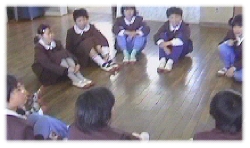
This is a cool game for smaller classes. You need to prepare 2 or 3 small cuddly toys. Koalas are cool!

1. Sit the kids in a circle.
2. Teach them "Please" i.e. "Koala please"
3. Pass the koala to a kid who says "Koala please".
4. The kids then pass the koalas amongst themselves. First of all a kid says "Please" and then receives the koala from the previous player.
5. Now the teacher introduces "Thank you".
6. Repeat as before, but this time after receiving the koala, the child says "Thank you"
7. Now the teacher introduces "You're welcome!". And repeat again.
If you have Shockwave installed, you can try out the "Online Koala Game" here!!
If you don't have Shockwave, you can download it for free by clicking here.
Å@
During the practice sessions, the teacher can introduce several koalas so that lots of kids get to practice.
This is a really effective game if you give personalities to your cuddly toys. This game was developed by Will, who has the "cute Koala" and the "fat koala"! The fact that the animals have names also seems to make the kids respect them more and take better care of them!!
This is a good game, but don't overplay it!
Whilst the teacher is close to the kids, it's a good
way to do pronunciation practice, as the kids can clearly
see the teachers mouth!
And yes, I do know that's not a koala at the top of the page - you try finding a cute animated koala on the web, it's not easy! : )
(I still haven't found an ostrich for the ostrich game either!)

Anyway, try it, it's a good game!
by Rachel Melville
I play a game similar to this, but with big bouncy balls instead of koalas. I put the kids in teams and they line up in their teams. The first child in each team has the ball. They pass it to the next child using the target conversation (Here you are, thank you, you're welcome etc.). Then the first child sits down and the second child gives the ball the next person and uses the same conversation. The first team to have everyone sitting down wins.
Once the kids get the hang of this, I extend the game by getting the last child in the line to run to the front when they get the ball and they start again. When the first child is the first in line again (everyone has run from the back to the front once), the team can sit down.
The kids love this game as they get so competitive they don't even realise that they are speaking English. The team mates help each other too, so it's very student centered. I have also used this game to practice other questions and answers (eg. How old are you? I'm six.) and have always found that it works well and is a great way to get the students to remember the target language.
Readers' Comments
by Stephanie
I also do this with passing different objects, or cards representing objects.
(I tried to do this with stationery objects but got scared to see the kids
throwing pencils, pens, scissors and such at each other as they "passed"
their objects down the line, so I made picture cards instead).
You can do the conversation where the student at the back of
the line picks a card, then the kid in front of them asks "What's that?" The kid
with the card replies "It's a pencil" But I always have the second kid pretend
that they couldn't hear what the kid with the object told them. Usually I just
ask them to say "What???" but it could be "Pardon/excuse me/ whatever you think
would be useful and fun for them." So the dialogue ends up like:
"What's that?"
"It's a pencil."
"WHAT??!"
"It's a pencil!!"
The pencil card is passed to the one who asked the question, and the child
in front of them then asks "What's that?" and continues.
Once the card gets to the first kid in line, they run to the back of the
line where the stack of other cards is waiting, and they start again.
The kids tend to get quite dramatic with their "WHAT?"
and very emphatic when they have to repeat "It's a pencil!!"
and it's nice to get them to say that part twice - more practice!
You can also do it in a circle, like the koala game. Gets pretty
hectic, but they seem to like it!
Å@
Sign up to get my top tips, games & hints via email! |
 |
|---|
|
|
Å@